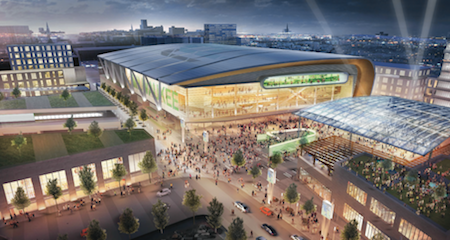July 31, 2015

A rendering of the new arena, by Populous Architecture.
The Wisconsin state senate passed a bill 21-10 that proposed public funding for the new Bucks arena. The bill, now traveling to the state assembly, is expected to pass without many hurdles.
The plan would preserve the NBA franchise in the city at a cost to the state, city and county residents who will eventually pay $400 million when accounting for interest over 20 years.
The new deal for the Bucks was voted on Wednesday and will replace the BMO Harris stadium where the team currently plays.
Although Republicans and Democrats have been divided on the aspect of public funding, Milwaukee County Executive Chris Abele and Mayor Barrett have been vocal supporters.
The initial cost of building a new stadium is expected to be around $500, half of which is publically funded and the other half funded by the team’s current and former owners.
“This deal has taken a lot of work, but the Bucks are big bucks for Wisconsin,” said Sen. Lena Taylor (D-Milwaukee), who voted for the plan.
A sticking point in the deal was an added proposal of moving Milwaukee’s debt collection program over to the state, which has more resources to collect unpaid property taxes and traffic fines. Sen. Chris Larson (D-Milwaukee) worked to insert the change, which Larson said was necessary to secure his vote for the arena.
Abele blasted the measure put in by Larson calling it “disastrous,” although later admitted the package was an overall “net positive.” He criticized the amendment saying that it protects those who don’t pay their taxes.
Larson and other Democrats who voted to keep the measure responded by saying billionaire team owners should not be funded by people who haven’t been able to pay their debts.
The Bucks previously threatened to leave the city if adequate public funding was not available – a tactic that’s under increased scrutiny as wealthy team owners continue demanding taxpayer support.
The measure to move county debt collection to the state was eventually scrapped and replaced by a two percent surcharge added to every ticket that will be sold. It moves some of the burden off from taxpayers, but the team is unwilling to see this pass, as it will increase ticket prices and lower margins. The new surcharge will need to produce roughly $4 million in revenue to replace money dropped from the old provisions.
Sen. Rob Cowles (R-Allouez) voted against the deal noting that Lambeau Field was renovated for the Green Bay Packers using an increase in the sales tax in Brown County that was approved by local voters.
“I think it is incredibly unfair that my constituents in Northeastern Wisconsin are being asked to pay for a sports arena in Milwaukee,” Cowles said in a statement.
Sen. Tim Carpenter (D-Milwaukee) is a Bucks season pass holder, but voted against the bill saying there wasn’t enough public input echoing a similar concern as Cowles.
“The burden of building a new stadium should fall on those who benefit directly from its construction,” said Carpenter in a statement.
Republicans control the assembly 63-36, but said the support of at least 15 Democrats is essential to get the package through. Leaders from both parties in the assembly have released statements calling for a bi-partisan debate on the issue and expect a vote in the upcoming weeks.
Assembly Minority Leader Peter Barca (D-Kenosha) and others said changes to the package are possible. If the assembly makes changes, the bill will return to the senate where it is likely to be passed. Sen. Scott Fitzgerald (R-Juneau) said he is confident the two houses could come to an agreement.
Above all, it means the Bucks, which started playing in Milwaukee as an expansion team in 1968, will remain in city for the foreseeable future and will not be moved to Seattle, Las Vegas or any other city.


